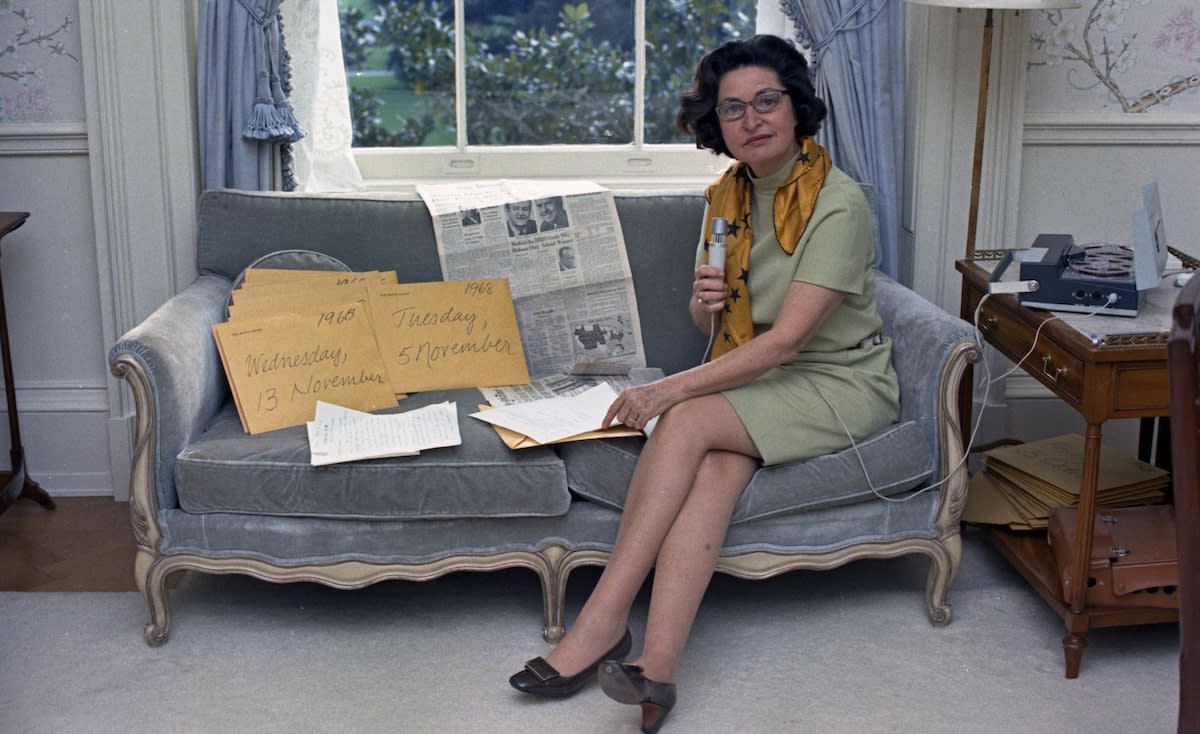‘The Lady Bird Diaries’ Review: The Late First Lady Gives One of the Great Star Turns of Any Recent Doc

- Oops!Something went wrong.Please try again later.
- Oops!Something went wrong.Please try again later.
- Oops!Something went wrong.Please try again later.
- Oops!Something went wrong.Please try again later.
The thing that strikes you first is her voice.
Lady Bird Johnson recorded 123 hours of audio tapes recounting the ins and outs of her husband Lyndon Johnson’s administration. The recordings form the spine of Dawn Porter’s illuminating new documentary, “The Lady Bird Diaries,” but they don’t just give a chronological sequence of events. These recordings are an artistic achievement in their own right, primary-source history executed with insight and wit, and as a kind of diaristic blank verse. It helps that Johnson had worked as a journalist; she has a way with words that’s deceptive because she’s not (overly) flowery, though her vocabulary is immense. Instead, she’s direct, spare in her descriptions, with her Texas drawl giving musicality to her prose. The space between the drama of her saying “I want to know what is going on, even if to know is to suffer” and her understated delivery is where obsession can flower.
More from IndieWire
Martin Scorsese Honors Robbie Robertson's Legacy with Tribute Concert: The Musician 'Broke Barriers'
Hunter Schafer Was 'Mind-Blown' Filming David Lowery's 'Mother Mary'
Listening to Lady Bird at length has the feeling you get listening to Sissy Spacek’s character’s voiceover in “Badlands”: seemingly tossed off with her “Sundys” and “Mundys”… but profound. The former First Lady has been dead for 16 years, and she made these recordings over five decades ago, but she has just become one of the great documentary stars of 2023, in part because she gets, so singularly, to tell her own story.
There’s her recounting of the events of November 22, 1963 — the 60th anniversary of which will see a flurry of new documentaries this year, but for which “The Lady Bird Diaries” represents a refreshing bit of counterprogramming — which thrust she and her husband into the White House. Her puzzlement at the aloofness of Robert F. Kennedy is fascinating (his muted clapping during the ceremony of the passage of the Civil Rights Act of 1964 “would not have disturbed a gnat sleeping calmly in his palm”). As is her shock at what she perceived as the waves “of hostility” radiating off Jackie Kennedy at RFK’s funeral some years later. She does not censor her journalistic impulses out of a desire to be diplomatic.
Little did Lady Bird know that she would have such a fantastic collaborator in telling her story as Dawn Porter. The documentarian who directed “Bobby Kennedy for President,” “John Lewis: Good Trouble,” and the extraordinary “The Way I See It,” about the photographer Pete Souza, who worked for both the Reagan and Obama administrations, has put together one of the most compelling bodies of non-fiction storytelling about recent American history that exists. Think more David McCullough than Ken Burns.
Just as Lady Bird’s perspective on the tumultuous ’60s is an original lens through which to view those events, so is Porter’s perspective and the way she gives Lady Bird a posthumous platform while slightly critiquing her — but never lording over her. “The Lady Bird Diaries” absolutely nails a moment where it shows that she still had sharecroppers on her land paying a quarter of their harvest to her and living in poverty — unfortunate and concerning by any measure — and also that her tenants were totally being used as political pawns by LBJ’s rivals, who really cared nothing for them and were just looking to score points and undermine his Great Society agenda. Porter’s is the kind of non-zero-sum thinking that’s refreshing in any discourse today. She’s created a cinematic conversation between two women — herself one of them — of different times, of different backgrounds, of different races, that feels like an act of time travel. In no way is this an over-directed film: It tells just what it needs to.
And Porter never puts her thumb on the scales in her approach to history, either: She uses animated illustrations from artist Molly Schwartz to reenact a remarkable moment when Eartha Kitt confronted Lady Bird over the Vietnam War which feels fair to all parties. If the First Lady seems a bit myopic in her initially dismissive view of the picket lines formed by Vietnam War protestors outside the White House — when the protest movement undoubtedly did have an effect on America’s eventual withdrawal from the conflict — one of her critiques feels prophetic of our moment of social media activism built around performative poses: “They think they are doing something when they’re noticed by the TV cameras. Many of the young confuse it with action.”
The result is an extremely multi-dimensional portrait of a First Lady, one who, you can’t help but think, was the most significant at that point since Eleanor Roosevelt in her accomplishments and her influence on policy. All throughout “The Lady Bird Diaries,” Johnson talks about how odd it is to be First Lady, how uncomfortable a role it is. Jackie Kennedy was an extraordinarily intelligent person in her own right, a former journalist and future Viking and Doubleday editor — but somehow, as the decades of sartorial obsession over her have borne out, she was defined more by being on display. Seventeen years Jackie’s elder and taken to dressing like the Queen, Lady Bird wasn’t confined to that more limited interpretation of the role. She cared more about what she was seeing than how she was seen. Funny thing is, Porter’s film actually does allow us to see her in a whole new appreciative light. She deserves it.
Grade: A-
“The Lady Bird Diaries” is available for streaming on Hulu now.
Best of IndieWire
Sign up for Indiewire's Newsletter. For the latest news, follow us on Facebook, Twitter, and Instagram.

